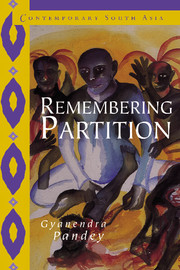Book contents
- Frontmatter
- Contents
- Acknowledgments
- List of abbreviations
- 1 By way of introduction
- 2 The three partitions of 1947
- 3 Historians' history
- 4 The evidence of the historian
- 5 Folding the local into the national: Garhmukhteshwar, November 1946
- 6 Folding the national into the local: Delhi 1947–1948
- 7 Disciplining difference
- 8 Constructing community
- Select bibliography
- Index
7 - Disciplining difference
Published online by Cambridge University Press: 06 January 2010
- Frontmatter
- Contents
- Acknowledgments
- List of abbreviations
- 1 By way of introduction
- 2 The three partitions of 1947
- 3 Historians' history
- 4 The evidence of the historian
- 5 Folding the local into the national: Garhmukhteshwar, November 1946
- 6 Folding the national into the local: Delhi 1947–1948
- 7 Disciplining difference
- 8 Constructing community
- Select bibliography
- Index
Summary
A nation is constructed not only as a bureaucratic, state-oriented community, but also as a moral one. That is what gives nationalisms their greater or lesser appeal and staying power. What constitutes this moral community? What gives us the right to call ourselves ‘Indians’? ‘Are we entitled to claim the status of true citizens, who have sacrificed family, caste, community and religion in the name of the nation?’ as one newspaper asked in September 1947.
The point I want to begin with here is the simple one of the unrealisable quality of the nationalist search for clarity and ‘purity’ in the midst of the blurring, mixing and uncertainty that is the actually existing condition of all nations and nationalisms. Nations everywhere have claimed to be defined by well-marked cultural–political boundaries. Yet, such boundaries are never easily drawn. Nationalist thought, therefore, commonly proceeds to carve out a core or ‘mainstream’ – the unhyphenated national, the real, obvious, ‘natural’ citizen (Indian, Nigerian, Australian, American, British, whatever). Alongside this core, there emerge notions of the hyphenated ‘national’ (Indian Muslims, Indian Christians, Indian Jews, or African-Americans, Mexican Americans and Indigenous Americans): minorities and marginal groups that might be part of the nation, but ‘never quite’.
How do nationalists set out to cleanse the sacred space of the nation – of Pakistan (the ‘Pure Land’) or ‘Mother India’? How are ‘impure’ elements to be dealt with? How do we contain, or discipline, difference?
- Type
- Chapter
- Information
- Remembering PartitionViolence, Nationalism and History in India, pp. 152 - 174Publisher: Cambridge University PressPrint publication year: 2001



